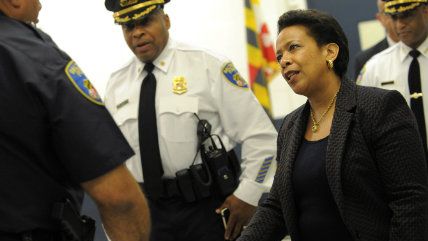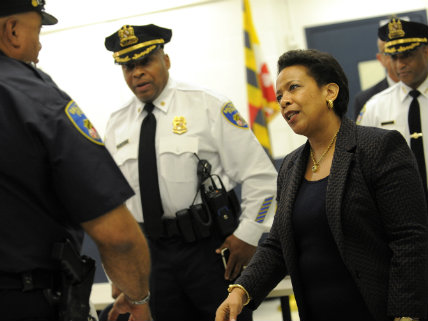The Justice Department Won't Stop Going to Bat for Bad Science
Forensic science is firmly weighted in favor of prosecutors and law enforcement, and the Justice Department intends on keeping it that way.


A recent review by a White House council on forensic science found that junk science is all too common in the criminal justice system, but the Justice Department is resisting recommendations to increase safeguards against scientifically invalid testimony and require greater disclosure of misconduct and shoddy work.
Last Wednesday, the President's Council of Advisers on Science and Technology (PCAST) released a report finding that reviews of several commonly used forensic methods—such as analysis of hair, bitemarks, and shoe-prints—"have revealed a dismaying frequency of instances of use of forensic evidence that do not pass an objective test of scientific validity."
In many of the fields that the report investigated, it found that there were no rigorous scientific studies establishing error rates or reliability. In the case of bitemark analysis—a notoriously subjective method, as former Reason reporter Radley Balko has extensively reported—the report found that "available scientific evidence strongly suggests that examiners not only cannot identify the source of bitemark with reasonable accuracy, they cannot even consistently agree on whether an injury is a human bitemark."
There have been numerous forensic scandals over the past several years. Last year, the FBI admitted that nearly every one of the experts at its microscopic hair analysis lab had given scientifically invalid testimony in almost 270 cases. Of those cases, 32 defendants were sentenced to death, and 14 were eventually executed or died in prison.
Despite the embarrassing admissions, not to mention the possibility that prosecutors could be putting innocent people in jail, the Justice Department has rejected PCAST's recommendations, which said the Justice Department should require forensic experts to disclose high error rates for some of those methods in their testimony and, where methods haven't yet been independently verified, not to use them at all.
"We remain confident that, when used properly, forensic science evidence helps juries identify the guilty and clear the innocent, and the department believes that the current legal standards regarding the admissibility of forensic evidence are based on sound science and sound legal reasoning," Attorney General Loretta Lynch said in a statement to The Wall Street Journal. "While we appreciate their contribution to the field of scientific inquiry, the department will not be adopting the recommendations related to the admissibility of forensic science evidence."
Likewise, the FBI in a statement to the Journal that it "disagrees with many of the scientific assertions and conclusions of the report" and said the report "makes broad, unsupported assertions regarding science and forensic science practice."
Criminal defense lawyers, however, say that the rejections of the PCAST recommendations, as well as several changes to a recently adopted code of ethics for forensic professionals, leaves the balance of power firmly weighted in favor of law enforcement and prosecutors.
"It's very disappointing that scientists should spend months putting together a comprehensive report that the Justice Department took about a minute and half to reject," National Association of Criminal Defense Lawyers president Barry Pollack says. "But at the end of the day, if the Justice Department does not comply with the recommendations, what it's going to find is judges are not going to admit forensic evidence it wants to introduce in trials around the country. In my view, ultimately the Justice Department is going to have to conform testimony to scientific standards."
As the report notes, judges are ultimately the "gatekeepers" of what evidence is admissible in court.
In an op-ed in The Wall Street Journal last Tuesday, Alex Kozinski, the outspoken chief judge of the Ninth Circuit Court of Appeals, called on the Justice Department to adopt the PCAST recommendations and reject what he called "voodoo science" plaguing the justice system.
"Among the more than 2.2 million inmates in U.S. prisons and jails, countless may have been convicted using unreliable or fabricated forensic science," Kozinski wrote. "The U.S. has an abiding and unfulfilled moral obligation to free citizens who were imprisoned by such questionable means."
Peter Neufeld, the co-director of the Innocence Project, which works to exonerate wrongly convicted people, says the Justice Department's decision "is a smackdown of transparency and neutrality and objectivity and independence."
"They really don't offer a single substantive criticism," Neufeld, also a member of the National Commission on Forensic Science, says. "All they do is summarily decide they're not going to adopt the recommendations. What's unfortunate is that sort of preemptive refusal is illustrative of a fundamental problem we've had with forensic science over the last 75 years: It's been controlled by law enforcement, not scientists."
Crime labs, which are relied on to give objective analysis of forensic evidence, are usually administered by law enforcement agencies, and the FBI trains forensic examiners in many state labs.
Critics like Neufeld say this arrangement is the proverbial fox guarding the hen house. The ACLU of Massachusetts is asking a judge to vacate an astonishing 24,000 drug convictions that were possibly tainted by the misconduct of a state crime lab chemist, who pled guilty in 2012 to forging test results in favor of law enforcement. In Orange County, Calif., a former crime lab official was accused in a court filing Wednesday of changing her testimony regarding DNA evidence to aid prosecutors in two murder trials.
The Justice Department, however, appears to have little interest in substantive changes to the status quo. For example, the National Commission on Forensic Science released a draft code of ethics for forensic science providers in March. The draft code included a mandate to inform all parties, including defendants and victims, when misconduct or a lack of professional standards adversely affects a case.
But when Attorney General Lynch formally adopted the new code of ethics in a Sept. 6 memo, it only required forensic providers to "inform the prosecutors involved […] of material nonconformities or breaches of law or professional standards that adversely affect a previously issued report or testimony."
The Justice Department is not legally obligated to directly inform defendants when such mistakes or misconduct occur, leaving it up to prosecutors. "[The Justice Department] will not acknowledge there's an ethical obligation to notify defendants," Neufeld says. "It's extraordinary."
Betty Layne DesPortes is a criminal defense attorney in Virginia and also the president-elect of the American Academy of Forensic Sciences. Speaking in her capacity as an attorney and not for the AAFS, DesPortes says the Justice Department made the correct decision, since government crime labs have strict protocols for who they can communicate with. The line scientists at the lab, DesPortes says, should remain scientists, not advocates.
However, both Neufeld and DesPortes say that just leaving it in the hands of prosecutors to fix the mistakes of expert witnesses that the prosecutors themselves put on the stand is not an ideal solution.
"Prosecutors have fallen down on their Brady duties," Desportes said, referring to prosecutors' constitutional obligation to disclose relevant evidence to the defense, "and always trusting prosecutors has resulted in many problems."
When The Washington Post investigated the Justice Department's probe of faulty FBI hair analysis testimony, it found that "while many prosecutors made swift and full disclosures [to defendants], many others did so incompletely, years late or not at all. The effort was stymied at times by lack of cooperation from some prosecutors and declining interest and resources as time went on." One defense attorney only learned that his client's case had been affected after he read it in the Post.
One solution, advocates say, is finally separating crime labs from law enforcement. In 2009, the National Research Council released a lengthy report on improving forensic science. Among its conclusions: "Scientific and medical assessment conducted in forensic investigations should be independent of law enforcement efforts either to prosecute criminal suspects or even to determine whether a criminal act has indeed been committed. Administratively, this means that forensic scientists should function independently of law enforcement administrators."
The National Commission on Forensic Science echoed the report's call in its proposed code of ethics, which would have mandated labs to "conduct independent, impartial, and objective examinations that are fair, unbiased, and fit-for-purpose."
Yet, in the eventual version adopted by the Justice Department, the word "independent" was dropped, and the language was changed to "conduct examinations that are fair, unbiased, and fit-for-purpose."
The Justice Department did not respond to a request for comment for this article.
DesPortes says that more rigorous testing, more oversight of prosecutors to ensure they notify defendants in a timely manner, and loosening some of the restrictions around crime labs—for instance, letting forensic scientists communicate with defense counsels and removing restrictions against them consulting on defense cases when it doesn't present a conflict of interest—could all go a long way in evening the playing field in forensic science.
"I think it can be improved with more emphasis on how science is supposed to operate," DesPortes says, "making sure scientists are able to do as science says: be objective."


Show Comments (43)